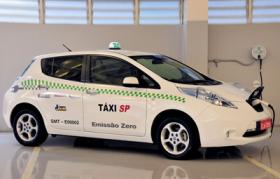A partnership between Municipality, Renault-Nissan Alliance, AES Eletropaulo and Association of Taxi, the project will provide 10 Nissan LEAFs for transportation in the largest city in Brazil.
SAO PAULO, Brazil (June 5, 2012) – Sao Paulo Municipality, along with the Renault-Nissan Alliance, AES Eletropaulo and Adetax (Association of Taxi Fleet of Sao Paulo), presented today a pilot program that will evaluate the viability of having electric vehicles operating as taxis in Sao Paulo City.
The study is the first concrete result of the Memorandum of Understanding (MoU) signed in June 2011, which sought the adoption of electric cars in the state capital. At the time, Sao Paulo was the first South American city to sign such an agreement.
The first two units of Nissan LEAFs, the first 100% electric vehicle in the world produced on a large scale, start the practical part of the pilot program in the coming weeks when they hit the streets. Both Nissan LEAF EV Taxis will circulate in a pre-defined circuit inside the Sao Paulo beltway. Vehicles will be located at the Paulista Avenue and Consolação Street corner, available to anyone who is interested in taking a zero emission shuttle. In the next step, scheduled for the middle of the second semester, the Sao Paulo electric taxi fleet will gain eight new units. All cars will be supplied by Nissan do Brasil.
The pilot program will feature professional taxi drivers, people who understand demands of urban mobility in the city of Sao Paulo and, consequently, have a lot to contribute. Professionals were trained by Nissan do Brasil in partnership with the City Transport Department and the Association of Taxi Fleet of Sao Paulo (Adetax).
In addition to studying the behavior of a vehicle with electric drive through the streets of Sao Paulo, the pilot program will have a charging network for vehicles. There will be 15 points in the circuit (five of them quick chargers) installed by energy company AES Eletropaulo, in which taxi drivers will be able to recharge the Nissan LEAF’s lithium-ion batteries in up to 30 minutes. Ten units can recharge the cars within 8 hours.
“It is our contribution to sustainable development of society,” says Britaldo Smith, president of Energy Company AES Brasil. “Through innovation and technology, there will be positive impact on the environment and population.”
The pilot program will be watched closely by partners, which will monitor and analyze the needs of taxi drivers, better places for quick charges, plus EV performance and maintenance, among other issues surrounding the initiative.
”Nissan is the manufacturer who is leading the zero emission program for cars. Within this pilot program in Sao Paulo, we reaffirm our global mission of promoting friendly environment without compromising the comfort of urban mobility,” says François Dossa, Administration & Finance VP of Nissan do Brasil. “This step also reinforces our commitment to Brazil growth, offering a vehicle with the innovation of zero emission and Japanese quality. We are committed to the country and strengthening our roots as we showed with the new plant in Resende (RJ) as well as the sponsorship of the Olympic Games 2016 in Transportation.“
With a range of 160 km on a single charge, Nissan LEAF has been designed from the beginning to meet the needs of modern urban mobility with the same proportions of a combustion engine vehicle, but without emissions that contribute to the greenhouse effect and noise pollution in urban centers.

